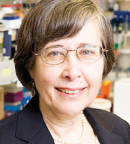
Connie J. Eaves, PhD, FRS
The American Society of Hematology (ASH) will honor Connie J. Eaves, PhD, FRS, of BC Cancer at the University of British Columbia, with the 2018 E. Donnall Thomas Lecture and Prize for her contributions to the field of hematopoiesis and stem cell research. Dr. Eaves will present her lecture, “Blood Stem Cells: A Simple Concept, but a Complex Reality,” on December 3 at the 60th ASH Annual Meeting & Exposition in San Diego. Her lecture will highlight key advances, future challenges, and exciting opportunities in hematopoietic stem cell research.
“I am incredibly honored to have been selected to deliver the E. Donnall Thomas Lecture at this year’s ASH annual meeting,” said Dr. Eaves. “For more than a century, researchers and physicians have been captivated by the possibility of understanding blood-forming stem cells and harnessing their potential. We have come a long way from the days when we lacked the technology to study the cellular processes involved in sustaining a lifelong supply of blood cells, and today we’re at the cusp of discoveries that will make this dream come true.”
This lectureship and prize is named after the late Nobel Prize laureate and past president of ASH, E. Donnall Thomas, MD. The E. Donnall Thomas Lecture and Prize recognizes pioneering research achievements in hematology that represent a paradigm shift or significant discovery in the field.
Professional Achievements
Dr. Eaves, Professor of Medical Genetics at the University of British Columbia and a distinguished scientist at the Terry Fox Laboratory at BC Cancer in Vancouver, is a leader in the field of hematopoiesis and a pioneer in the characterization of leukemia stem cells. Among her many notable contributions to the field, Dr. Eaves is known for developing methods to measure and characterize both mouse and human hematopoietic stem cells based on their growth and mature cell outputs. She was also the first to demonstrate examples of clonal hematopoiesis from normal cells in humans based on X-chromosome inactivation studies, thus anticipating a topic now of increasing interest and relevance to many aspects of normal and malignant human biology. ■

